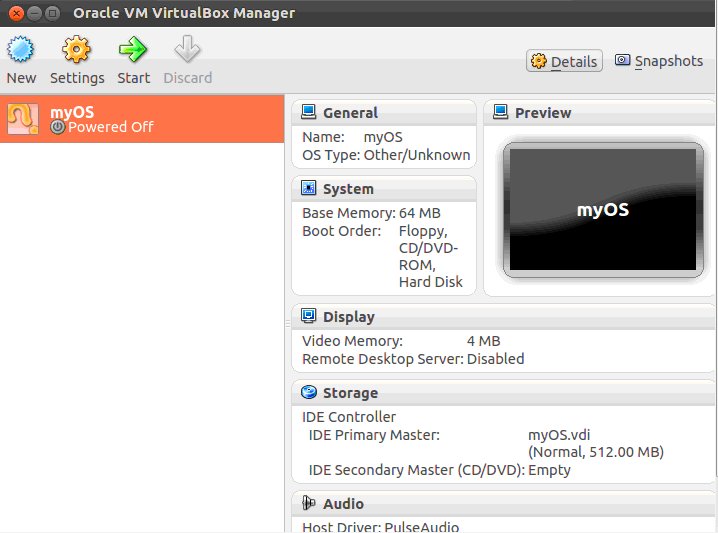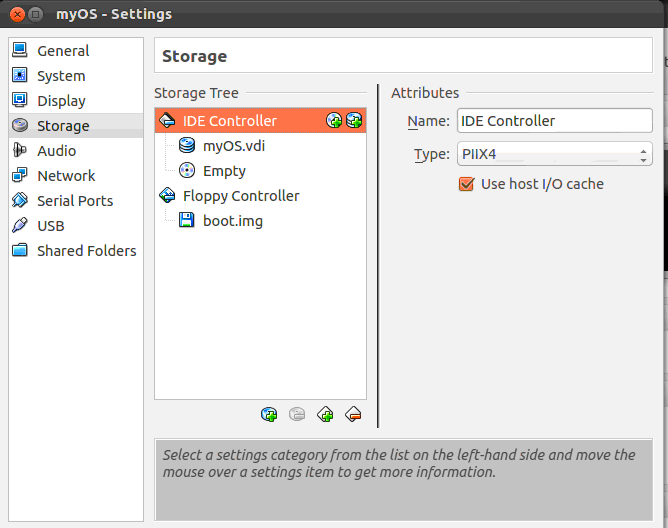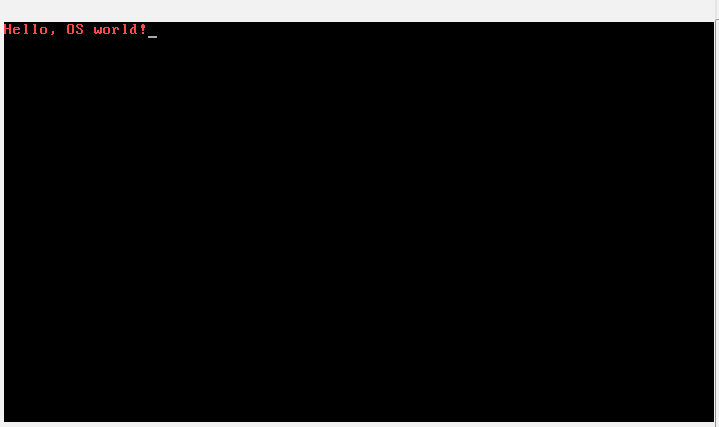1.最简单的操作系统(linux版)(一)运行效果
大部分内容来自WB. YANG的一本书,书名忘记了 1.linux所需要的安装的工具vim, virtualbox,g++ 2.编写自己的操作系统,懒得在linux上装个输入法,只好用蹩脚的英文写的注释,阅读时请自带避雷针系统引导程序:boot.S1 .code16#使用16位模式汇编2 .text#代码段开始3
1.linux所需要的安装的工具
vim, virtualbox,g++
2.编写自己的操作系统,懒得在linux上装个输入法,只好用蹩脚的英文写的注释,阅读时请自带避雷针
系统引导程序:boot.S
1 .code16 #使用16位模式汇编
2 .text #代码段开始
3 mov %cs, %ax #初始化栈寄存器、数据段寄存器和通用段寄存器
4 mov %ax, %ds
5 mov %ax, %es
6 call DispStr #调用字符串显示函数,call function to display string
7 jmp . #while(1),无限循环
8 DispStr: #字符串显示函数
9 mov $BootMessage, %ax
10 mov %ax, %bp #ES:BP = address of string
11 mov $16, %cx #CX = length of string
12 mov $0x1301, %ax #AH = 13, AL = 01h
13 mov $0x00c, %bx #page number = BH=0, word color = BL = 0Ch
14 mov $0, %dl
15 int $0x10 #进入中段10h is interrupt number
16 ret #返回
17 BootMessage:.ascii "Hello, OS world!"
18 .org 510 #fill 0 in first 510 BYTE
19 .word 0xaa55 #end with 0xaa55
连接脚本:wind_x86.ld
1 SECTIONS
2 {
3 . = 0x7c00;
4 .text :
5 {
6 _ftext = .; /*program will be loeaded to 0x7c00*/
7 } = 0
8 }
编译连接文本Makefile
1 CC=g++
2 Ld=ld
3 LDFILE=wind_x86.ld
4 OBJCOPY=objcopy
5
6 all:boot.img
7
8 #Step 1:g++ call as, boot.S -> boot.o
9 boot.o:boot.S
10 $(CC) -c boot.S
11
12 #Step 2:ld call link script, boot.o -> boot.elf
13 boot.elf:boot.o
14 $(LD) boot.o -o boot.elf -e c -T$(LDFILE)
15
16 #Step 3:objcopy remove the useless section(such as .pdr, .commemnt, .node) i n boot.efl,
17 # strip all signal information, the output is boot.bin
18 boot.bin:boot.elf
19 @$(OBJCOPY) -R .pdr -R .comment -R .note -S -O binary boot.elf boot.bin
20
21 #Step 4:generate bootable software image
22 boot.img:boot.bin
23 @dd if=boot.bin of=boot.img bs=512 count=1 #用 boot.bin 生成镜像文件第一个扇区
24 # 在 bin 生成的镜像文件后补上空白,最后成为合适大小的软盘镜像
25 @dd if=/dev/zero of=boot.img skip=1 seek=1 bs=512 count=2879
26
27 clean:
28 @rm -rf boot.o boot.elf boot.bin boot.img
boot.S -> boot.o -> boot.elf -> boot.bin ->boot.img
3.生成os的镜像文件
把以上三个文件放在同一个目录,并输入make,则在同一目录生成boot.img
4.加载和运行
运行virtualbox
new一个新的操作系统
setting->storage->Add controller->Add floopy controller->add floopy deviec->choose disk->导入上一步中生成的boot.img
start
5.相关链接:
运行自己的操作系统-开发环境说明 http://blog.csdn.net/mishifangxiangdefeng/article/details/45749109
运行自己的操作系统 -0.01 (二)makefile http://blog.csdn.net/mishifangxiangdefeng/article/details/45749417
运行自己的操作系统 -0.01 (三)链接脚本 http://blog.csdn.net/mishifangxiangdefeng/article/details/45766503
运行自己的操作系 -0.01 (四)boot.S http://blog.csdn.net/mishifangxiangdefeng/article/details/45768167
本文中的内容,主要来自于WB. YANG的一本书,书名《writeos-1.0-2-weekly》,
提供链接http://download.csdn.net/detail/mishifangxiangdefeng/5869801
更多推荐
 已为社区贡献3条内容
已为社区贡献3条内容













所有评论(0)